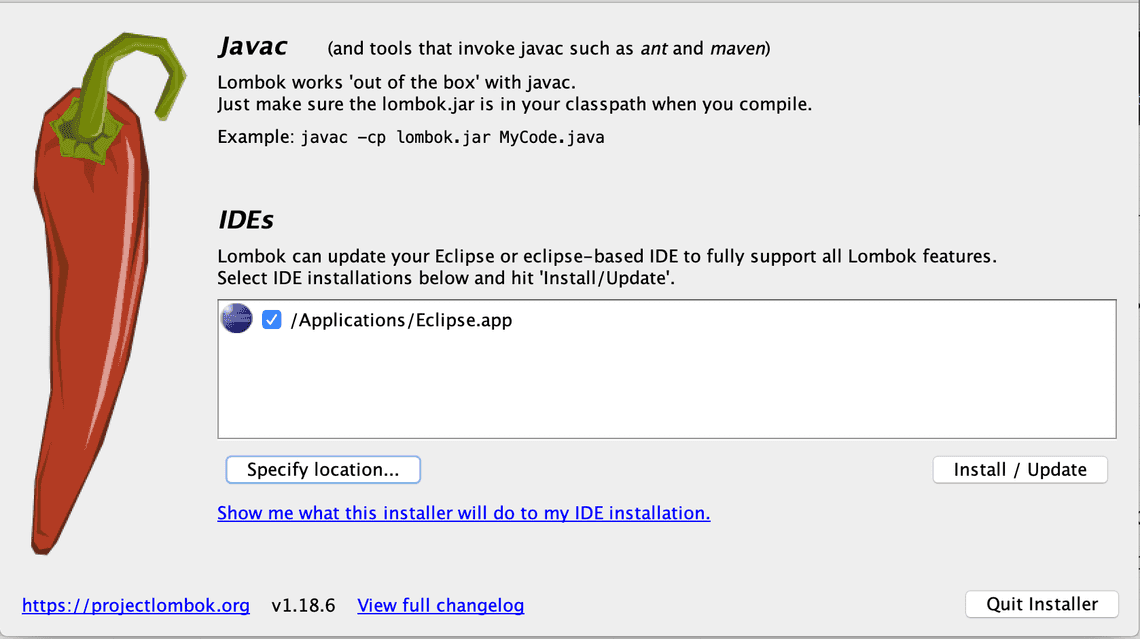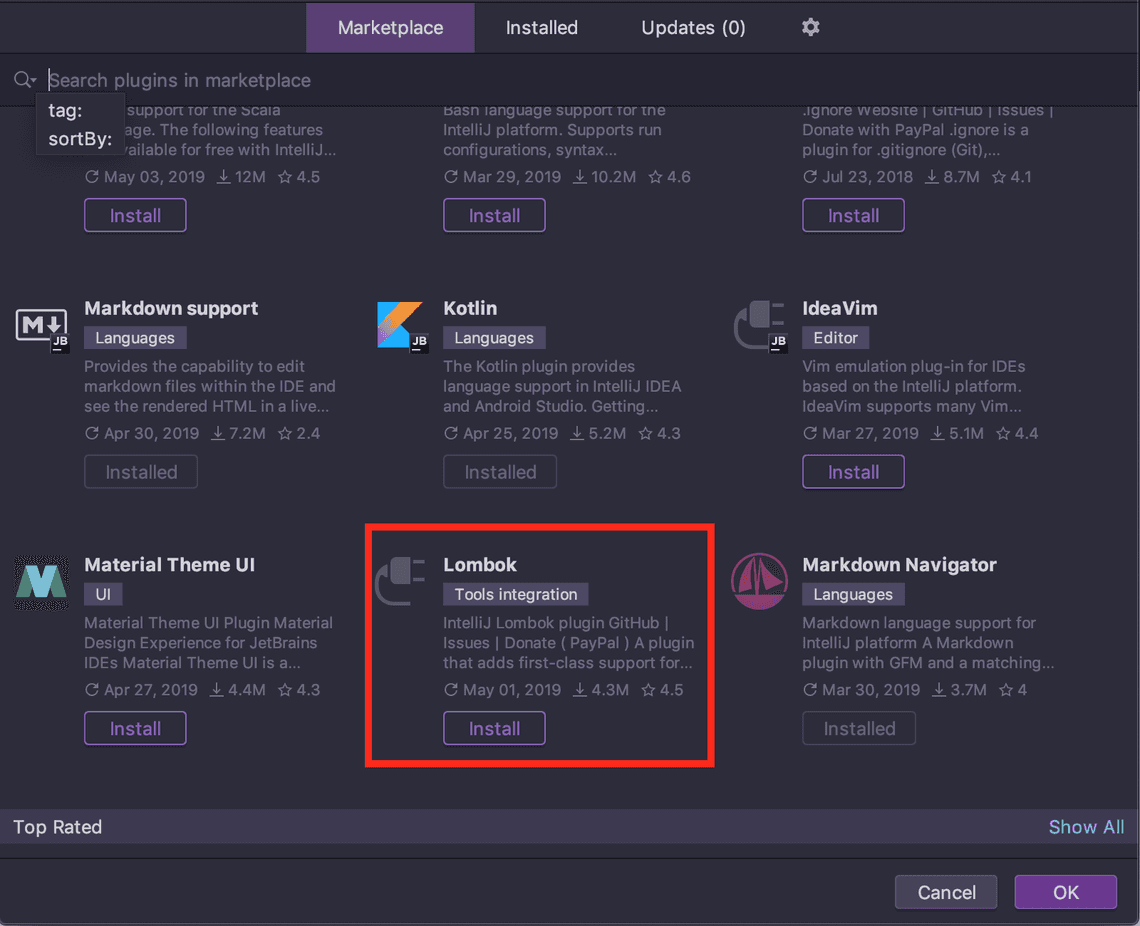Java + Lombok

Learn to add and configure lombok in your favorite IDE to boost java development
Intro
I always heard comments from other developers things like: “Java is a very verbose language”, or Hello World line count comparison between Java vs Other X Language. And I also think that this is true, when you develop pure Java (without extensions, libs and plugins) compared to other modern languages, the developer ends up writing more to reach the goal. However, since some time ago, we have a lib called lombok that helps you simplify (a lot) the life of those who develop with java.
Features
Lombok is a lib that provides a collection of annotations that eases some repetitive java tasks (such as, getters and setters creation). Besides of being dependency of your project, it connects in your IDE making it understand the annotations, so it requires a certain configuration. In this guide I’ll show how to configure it on eclipse, intellij idea and also vscode. If you don’t know how to work with java with vscode take a look at here.
The github repository with the sample classes can be found at: https://github.com/danielpadua/lombok-examples
Requirements
- Java JDK 8 or higher
- Eclipse or IntelliJ IDEA or vscode
IDE configuration
Use the sections below according to the IDE you are using:
Eclipse
Download latest lombok.jar at: https://projectlombok.org/download, store this file in some directory of your choice (e.g.: your user’s home folder). From this moment on, there are two ways of configuring eclipse:
- Run the lombok.jar. It will open a window that will search in all folders of your machine looking for IDEs and if it finds eclipse it will display a checkbox to enable. So, click install and it will be done, as the image below:

- If method 1 didn’t work or didn’t found any IDE, we will do the same work jar does under the hood but manually. Open the
eclipse.inifile located under the configuration directory of the eclipse that you use, and edit it as below:

-javaagent:${full_path}/lombok.jar
We are just adding the full path of lombok’s jar as eclipse’s initialisation argument, and this will make it understands lombok. Lombok’s jar does exactly the same thing, but it copies the jar inside of eclipse installation folder and writes eclipse.ini automatically.
IntelliJ IDEA
It’s really simple enable Lombok support in IntelliJ IDEA, to do so, open plugin installation section and install the highlighted plugin:

Restart IntelliJ IDEA and Lombok support will be enabled.
vscode
Search for lombok at the extensions tab:

Install the Gabriel Basilio Brito’s extension, which is recommended by lombok: https://projectlombok.org/setup/vscode. Restart vscode:

Project
First we need to create a java spring-boot project, so:
To create a java spring-boot in eclipse follow this guide: here.
To create a java spring-boot in intellij idea follow this guide: here.
To create a java spring-boot in vscode follow this guide: here.
After creating the project, use the sections below depending on the build-tool that you are using:
Maven
Add lombok’s dependency in pom.xml:
<dependency><groupId>org.projectlombok</groupId><artifactId>lombok</artifactId><version>1.18.6</version><scope>provided</scope></dependency>
You may need to force maven import update on your IDE.
Gradle
Add lombok’s depedency in build.gradle file:
repositories {mavenCentral()}dependencies {compileOnly ‘org.projectlombok:lombok:1.18.6’annotationProcessor ‘org.projectlombok:lombok:1.18.6’}
Usage
Now let’s explore what lombok has to offer for us to reduce boilerplate code:
Getters, Setters, Constructors, ToString, Equals e HashCode
To enable getter in all fields of your class, annotate above your class name: @Getter.
To enable setter in all fields of your class, annotate above your class name: @Setter.
To create a constructor with all fields as input parameter, annotate above your class name: @AllArgsConstructor, without parameters: @NoArgsConstrutor, with required fields (or non-null): @RequiredArgsConstructor
To implement default toString() use: @ToString,
To implement default equals() and hashCode() use: @EqualsAndHashCode
The @Data annotation above class is a shortcut to: @ToString, @EqualsAndHashCode, @Getter, @Setter and @RequiredArgsConstructor together.
Without lombok:
package br.com.danielpadua.lombok_examples;public class Dog {private Integer id;private String name;private String breed;public Dog(Integer id, String name, String breed) {this.id = id;this.name = name;this.breed = breed;}public Integer getId() {return id;}public void setId(Integer id) {this.id = id;}public String getName() {return name;}public void setName(String name) {this.name = name;}public String getBreed() {return breed;}public void setBreed(String breed) {this.breed = breed;}@Overridepublic int hashCode() {final int prime = 31;int result = 1;result = prime * result + ((breed == null) ? 0 : breed.hashCode());result = prime * result + ((id == null) ? 0 : id.hashCode());result = prime * result + ((name == null) ? 0 : name.hashCode());return result;}@Overridepublic boolean equals(Object obj) {if (this == obj)return true;if (obj == null)return false;if (getClass() != obj.getClass())return false;Dog other = (Dog) obj;if (breed == null) {if (other.breed != null)return false;} else if (!breed.equals(other.breed))return false;if (id == null) {if (other.id != null)return false;} else if (!id.equals(other.id))return false;if (name == null) {if (other.name != null)return false;} else if (!name.equals(other.name))return false;return true;}@Overridepublic String toString() {return "Dog [id=" + id + ", name=" + name + ", breed=" + breed + "]";}}
With lombok:
package br.com.danielpadua.lombok_examples;import lombok.Data;import lombok.NonNull;@Datapublic class Dog {@NonNullprivate Integer id;@NonNullprivate String name;@NonNullprivate String breed;}
Immutable classes
Use the annotation: @Value above the class, to make it immutable
Without lombok:
package br.com.danielpadua.lombok_examples;public class DogCreateRequest {private final String name;private final String breed;public DogCreateRequest(final String name, final String breed) {this.name = name;this.breed = breed;}public String getName() {return name;}public String getBreed() {return breed;}@Overridepublic int hashCode() {final int prime = 31;int result = 1;result = prime * result + ((breed == null) ? 0 : breed.hashCode());result = prime * result + ((name == null) ? 0 : name.hashCode());return result;}@Overridepublic boolean equals(Object obj) {if (this == obj)return true;if (obj == null)return false;if (getClass() != obj.getClass())return false;DogCreateRequest other = (DogCreateRequest) obj;if (breed == null) {if (other.breed != null)return false;} else if (!breed.equals(other.breed))return false;if (name == null) {if (other.name != null)return false;} else if (!name.equals(other.name))return false;return true;}@Overridepublic String toString() {return "DogCreateRequest [name=" + name + ", breed=" + breed + "]";}}
With lombok:
package br.com.danielpadua.lombok_examples;import lombok.Value;@Valuepublic class DogCreateRequest {String name;String breed;}
Builder pattern
Use the annotation: @Builder above the class to create the builder pattern
Without lombok:
package br.com.danielpadua.lombok_examples;import java.util.Collection;import java.util.Collections;import java.util.HashSet;import java.util.Set;public class Kennel {private Integer id;private String name;private Set<Dog> dogs;public Kennel(Integer id, String name, Set<Dog> dogs) {this.id = id;this.name = name;this.dogs = dogs;}public static KennelBuilder builder() {return new KennelBuilder();}public static class KennelBuilder {private Integer id;private String name;private HashSet<Dog> dogs;KennelBuilder() {}public KennelBuilder id(Integer id) {this.id = id;return this;}public KennelBuilder name(String name) {this.name = name;return this;}public KennelBuilder dog(Dog dog) {if (this.dogs == null) {this.dogs = new HashSet<Dog>();}this.dogs.add(dog);return this;}public KennelBuilder dogs(Collection<? extends Dog> dogs) {if (this.dogs == null) {this.dogs = new HashSet<Dog>();}this.dogs.addAll(dogs);return this;}public KennelBuilder clearDogs() {if (this.dogs != null) {this.dogs.clear();}return this;}public Kennel build() {Set<Dog> dogs = Collections.unmodifiableSet(this.dogs);return new Kennel(this.id, this.name, dogs);}@Overridepublic String toString() {return "KennelBuilder [id=" + id + ", name=" + name + ", dogs=" + dogs + "]";}}}
With lombok:
package br.com.danielpadua.lombok_examples;import java.util.Set;import lombok.Builder;import lombok.Singular;@Builderpublic class Kennel {private Integer id;private String name;@Singularprivate Set<Dog> dogs;}
Logging
Slf4j is one of the supported log interfaces, take a look at: https://projectlombok.org/features/log to see all the supported
Without lombok:
package br.com.danielpadua.lombok_examples;public class App{private static final org.slf4j.Logger log = org.slf4j.LoggerFactory.getLogger(App.class);public static void main( String[] args ){log.info( "Hello World!" );}}
With lombok:
package br.com.danielpadua.lombok_examples;import lombok.extern.slf4j.Slf4j;@Slf4jpublic class App {public static void main(String... args) {log.info("Hello world");}}
Conclusion
Despite the setup and configuration time spent, lombok was developed aimed to boost productivity of java developers. I’ve been using this lib for some time and I’m not thinking of stopping using it!
See you soon!
Related Posts
Legal Stuff

